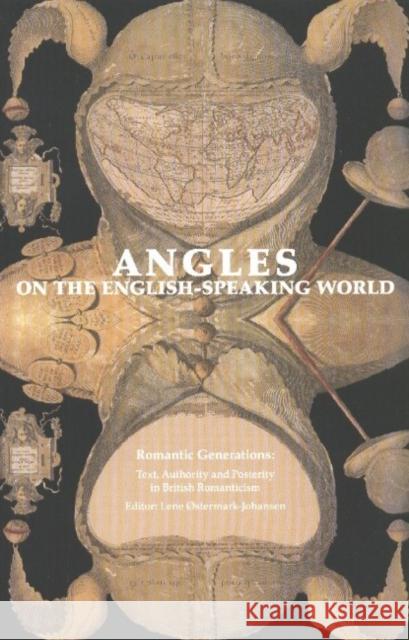Romantic Generations -- Text, Authority & Posterity in British Romanticism » książka
Romantic Generations -- Text, Authority & Posterity in British Romanticism
ISBN-13: 9788772898605 / Angielski / Miękka / 2003 / 179 str.
Romantic Generations -- Text, Authority & Posterity in British Romanticism
ISBN-13: 9788772898605 / Angielski / Miękka / 2003 / 179 str.
(netto: 97,75 VAT: 5%)
Najniższa cena z 30 dni: 101,59 zł
ok. 30 dni roboczych
Bez gwarancji dostawy przed świętami
Darmowa dostawa!
Unlike the first two volumes of "ANGLES" on the English-Speaking World, this special issue does not originate in a set of conference papers. The idea of compiling a collection of essays on Romanticism emerged from the unusually strong concentration on Romantic studies among the graduate students of the English Department a couple of years ago. This volume places their work in the context of distinguished international scholars of greater seniority, scholars who have become academic contacts through conferences and assessment committees, and whose contributions I am very pleased to be able to include alongside the works of local contributors. The Romantic generations of the title of this volume thus strike a number of different chords: generations of scholars in Romantic studies; conventional divisions of Romantic poets into first, second and possibly third generations; the self-generative aspect of Romanticism; the awareness of poetic reputation and the image and afterlife of the poet. The collection spans just over a hundred years, from the 1780s to the 1890s, and while not in any way attempting to define Romanticism or raise issues of periodization the volume allows for the continued existence of Romantic features right until the end of the nineteenth century. Poetry looms large in this issue of ANGLES; apart from Ian Duncan's essay on Hume, Scott, and the "Rise of Fiction",' all the other essays are in some way concerned with the Romantic poet and his poetry. The Romantic poet is thus represented as a collector and editor of ballads, as a political radical and printmaker, as other to himself, essentially ignorant of the process of poetic composition, as a rival and collaborator with other poets, or as a poet long dead, the subject of successive generations of poetic lament. The boundaries between poetry and the visual arts is explored in a couple of the essays; indeed, the rivalry between portraiture and literature pervades no less than three of the contributions, and no matter whether the subject of inquiry is the image of the poet or the image of the poet's mother, the Romantic poet displays a high degree of self-consciousness with respect to both literary and visual media. Romantic generations generate both selves and others in poetry and portraiture.











